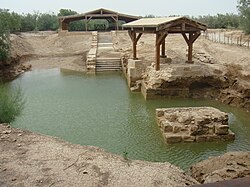Holy Places at Jerusalem
| Al-Maghtas | |
|---|---|
| Name as inscribed on the World Heritage List | |

Al-Maghtas ruins on the Jordanian side of the Jordan River are the location for the Baptism of Jesus and the ministry of John the Baptist.
|
|
| Location | Balqa Governorate, Jordan |
| Type | Cultural |
| Criteria | iii, vi |
| Reference | 1446 |
| UNESCO region | Arab States |
| Inscription history | |
| Inscription | 2015 (39th Session) |
Holy places, (Loca sancta) are sites that a religion considers to be of special religious significance. They are usually places visited by pilgrims.
Located in Bahji near Acre, Israel, the Shrine of Bahá'u'lláh is the most holy place for Bahá'ís and their Qiblih, or direction of prayer. It contains the remains of Bahá'u'lláh, founder of the Bahá'í Faith and is near the spot where he died in the Mansion of Bahjí. The second holiest site is the Shrine of the Báb in Haifa.
In Iran, the Baha'is possessed several important holy sites, including the House of the Bab in Shiraz; the House of Baha' Allah's father in Tehran; the shrine and grave of Quddus. Since the Revolution, all these places have been demolished, and a mosque has been built on the site of the Bab's house.
The Buddha is said to have identified four sites most worthy of pilgrimage for Buddhists, saying that they would produce a feeling of spiritual urgency. These are:
In the later commentarial tradition, four more sites were added to make Eight Great Places, places where a miraculous event is reported to have occurred:
There are various other locations in India and Nepal associated with the Buddha, and there are holy sites located throughout Asia for each Buddhist tradition, for instance in Afghanistan, Cambodia, China, India, Indonesia, Japan, Laos, Myanmar, Nepal, Sri Lanka, South Korea and Thailand. Lhasa in Tibet contains many culturally significant Tibetan Buddhist sites such as the Potala Palace, Jokhang temple and Norbulingka palaces.
...
Wikipedia
